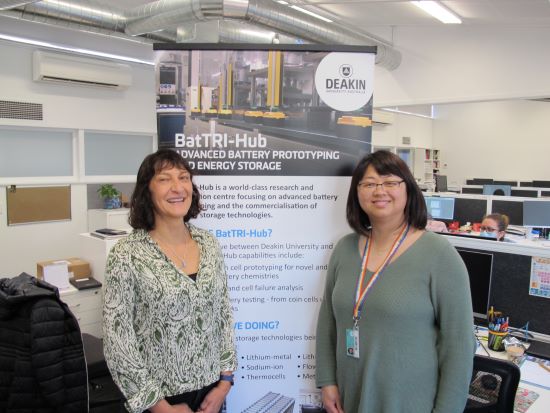A team of researchers from Deakin University’s Institute for Frontier Materials (IFM) have used computer modelling and simulations to progress the design of a new type of solid-state polymer electrolyte, showing its potential use in various types of polymer-based solid-state batteries, particularly sodium and potassium batteries.
Rechargeable batteries paired with sodium metal anodes are considered to be one of the most promising high-energy and low-cost energy-storage systems. However, the use of highly reactive sodium metal and the formation of sodium dendrites during battery operation have caused safety concerns, especially when highly flammable liquid electrolytes are used.
New research, published in the journal Nature Materials, suggests that by using polymer as the ion conductor rather than the flammable liquid solvents currently used in lithium-ion batteries, the energy storage is greener, safer, and less expensive.
Lead researcher Dr Fangfang Chen said the team used a computer-to-lab material design strategy, applying modelling and simulations to find the best compositions for polymer electrolytes.
“This work has been devoted to developing new polymer electrolyte chemistries that can be used with high-energy metals that are more abundant and less expensive than lithium, such as sodium and potassium,” she said. “The new materials can contribute to a more sustainable, greener future battery technology, as well as providing society with safer, high-performance energy storage devices.”
Chen’s research partner Professor Maria Forsyth said the work expands upon current knowledge of electrolyte systems and provides an alternative to the dominant lithium-ion technology.
“Lithium-based technology is expensive, in-demand and increasingly scarce, so breakthroughs that provide alternative, inexpensive, and safe energy storage options are of major significance,” she said.
“We can now offer an alternative path to realising polymer-based solid-state batteries. This is a significant milestone, and this process will act as a design criterion for further development in this field of research.”

Image: Deakin University
The research results come after Forsyth and Dr Xiaoen Wang last month announced they had developed solvent-free solid polymer electrolytes based on a perfluoropolyether-terminated polyethylene oxide-based block copolymer for all-solid-state sodium metal batteries.
“Most industries that develop sodium batteries generally use carbon-based electrode and liquid electrolyte, which has low capacity and also can fuel a fire if the battery overheats,” Wang said.
“We are taking a different approach, using reactive sodium metal as an anode to increase battery capacity and in the process are developing safer electrolytes to ensure the safety of sodium batteries.”
A key component in the electrolyte – a fluorine-containing class of polymer – was developed by Dr Cheng Zhang and Professor Andrew Whittaker from the University of Queensland’s Australian Institute for Bioengineering and Nanotechnology. Originally used for biological applications, this is the first time the polymer has been used in solid-state sodium batteries.
Wang said one drawback of current sodium batteries is that they do not last as long as lithium batteries and have a lower energy density. However, in pairing them with the new polymer electrolytes, the researchers believe that sodium batteries could offer close to 1,000 cycles, comparable to current lithium-ion batteries.
The research team said small-scale testing of the batteries has been successful, with upscaling and prototyping coming soon. Wang said with further research, opportunities could be on the horizon for use in stationary energy storage such as solar or even in electric vehicles.
This content is protected by copyright and may not be reused. If you want to cooperate with us and would like to reuse some of our content, please contact: editors@pv-magazine.com.









4 comments
By submitting this form you agree to pv magazine using your data for the purposes of publishing your comment.
Your personal data will only be disclosed or otherwise transmitted to third parties for the purposes of spam filtering or if this is necessary for technical maintenance of the website. Any other transfer to third parties will not take place unless this is justified on the basis of applicable data protection regulations or if pv magazine is legally obliged to do so.
You may revoke this consent at any time with effect for the future, in which case your personal data will be deleted immediately. Otherwise, your data will be deleted if pv magazine has processed your request or the purpose of data storage is fulfilled.
Further information on data privacy can be found in our Data Protection Policy.